For three weeks in January, DePauw students break from the traditional semester schedule to focus on a single interest—on campus or around the world. Join us here every day for 22 days as we check in on student adventures.
This is Winter Term.
day 22 - BACKSTAGE SECRETS: DESIGN AND REALIZATION DEPAUW OPERA
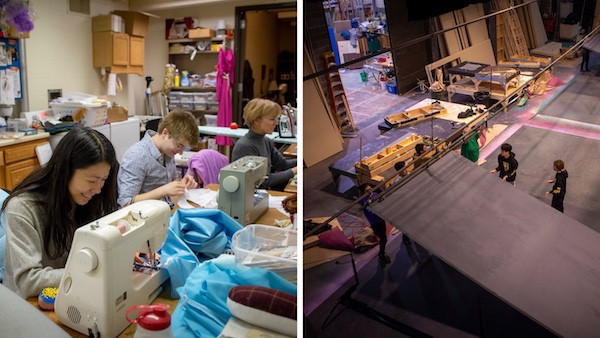
It takes a team – a rather large team – to produce DePauw Opera, and this winter-term course gives students active roles in backstage development, design and/or production of Massenet’s “Cinderella.” No experience is required to take this course and, given the scope of the production, there is something for everyone.
Assignments run the gamut and include stage management, scenery, costume, lighting, sound, properties, publicity and dramaturgy/musicology.
Communication and theatre professor Susan Anthony gives students the choice to either gain depth in one area or work in different areas to see what they like. Assignments are made according to the needs of the production, and also according to the student’s ability, experience and interest. Students work in production shops (scenery, costume, etc.) and/or in rehearsals in addition to specific assignments outside of class meetings.
Students gain an understanding of opera and how their production assignment contributes to the total work of art. The goal, Anthony says, is to “tie the practical and creative work together.”
Nya Flowers ’21 likes working behind the scenes. She didn’t have production experience before taking this course, “but I am definitely interested in pursuing other opportunities just like my winter term,” she says. “A highlight for me is being able to have an impact on a show that people will see. The backstage and behind-the-scenes work is so essential to ensure the safety of actors and performers and to show craftiness and artistry throughout the work with props and scene settings.
“I have learned that you can make use out of any and everything. You just have to have a very strategic approach for its use. I also have fallen in love with lighting. I had the opportunity to put on a light show for my class, and the creation to me was magical.”
DePauw Opera presents “Cinderella” Feb. 7-10. For more information, including a link to purchase tickets, visit the DePauw Opera and musical webpage.
Day 21 - Kaffee und Kuchen and the Temptation of Spices
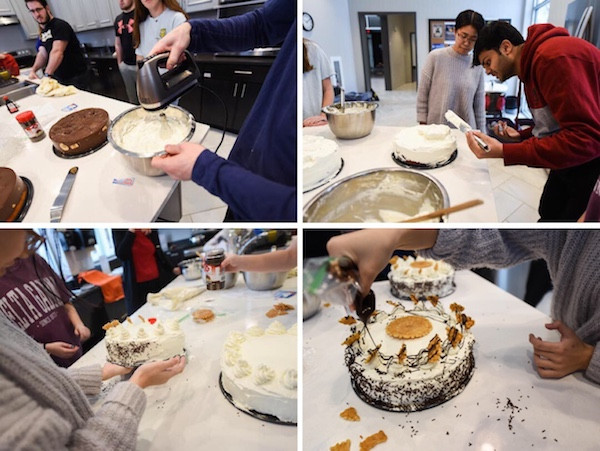
Sunday afternoon coffee and cake or, in German, ‘kaffee und kuchen,’ as well as inviting friends over to enjoy them are very much a part of German and Austrian culture. This winter-term course is taught by Inge Aures, professor of modern languages (German), and is part experimental and practical and also part academic.
Students are introduced to the world of German and Austrian baking and also are learning basic baking techniques. At the same time, they’re exploring the history of food and food culture through readings and class discussions. Students prepare individual and group presentations on various aspects of food and the cultural significance of food, including the history of spices and chocolate. And there is baking … lots of baking.
“I chose to take this class because I love baking,” Adrienne Pemberton ’22 says. “Seeing so many different ingredients combine together to make a cake is so cool. Also, my grandpa works in Germany so this is a great way to connect with him so far away.
“Through this class I’ve learned how to bake some complicated cakes,” Pemberton says, “as well as learn about the spice trade and how spices have been used for different uses throughout history.”
Rana Hamza ’22 chose to take the class to try something new. “I really did not have any kind of experience in baking before this class so it provided me with an opportunity to learn how to bake and try classic German desserts, which I have to say are delicious.”
He says, “I also took this course because it is not all baking, but also required group work and class presentations, which I thought would be a good way of putting myself out of my comfort zone by presenting to a class.
“I think this class has definitely challenged me and has improved my team working skills by teaching me to share the load with my partners, in the kitchen and in group assignments. It has also challenged me to present in front of a group of people, which I think is a useful skill to have.”
Interesting fun fact that Hamza learned? “One of the first uses of pepper was discovered in the nose of Ramses II, which was found upon examination through an X-Ray.”
day 20 - Women in photography: the gendered lens

With the proliferation of smart phones, cameras are everywhere. But rather than snapping a selfie or a photo of food, students in this Women in Photography class are using their cameras as a tool to question the role of gender and identify in their own lives.
Under the direction of photographer Cynthia O’Dell, the A. Reid Winsey professor of art and art history, students were asked to create photographs as an act of empowerment, depicting themselves in any way they chose.
Click here to see more photos.
Day 19 - I'm all the way up: A cross-cultural journey through the Peruvian Andes
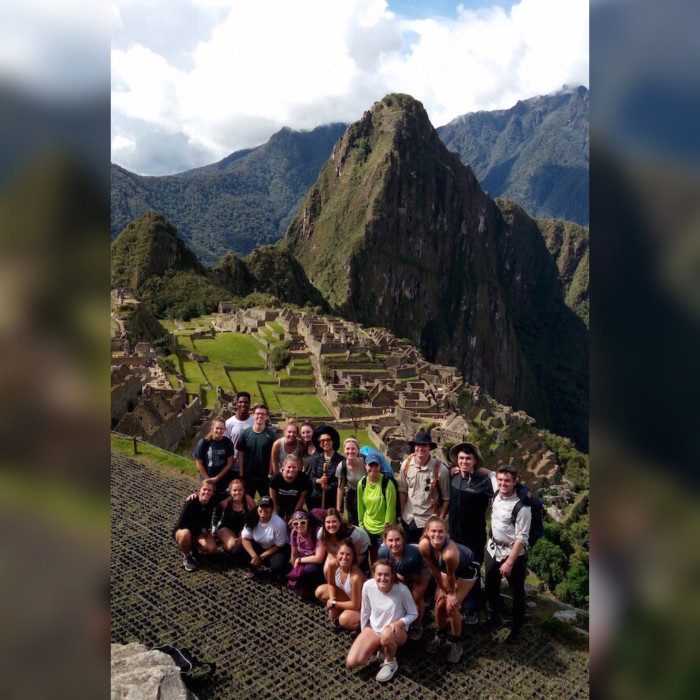
DePauw students in this winter-term course are getting a cultural introduction to modern Peru as a reflection of its indigenous and Spanish roots.
Throughout 17 days abroad, students have been learning about urban development, migration and the relationships among the country’s multiple ethnic groups. The trip is led by Sherry Mou, professor of modern languages (Chinese) and Asian studies and director of the Asian studies program, and Ariel Zach, assistant professor of modern languages (Spanish).
Students are traveling by land, water and air along the Pacific coast, up the Andean mountains and down through the Amazon rainforest to examine the role Peru’s diverse natural landscape plays in shaping its national identity. After flying over the Nazca Lines, they spent a day at Machu Picchu (see above photo), the most prominent landmark of the Inca Empire, with a day of trekking the Inca trail followed by soaking in a natural, thermal bath.
Their adventures include stops in modern towns populated by Inca descendants, the Quechua people, to bargain their way through indigenous handicraft markets, including one that floats on Lake Titicaca.
“My favorite part of the trip so far has been observing the geology of the various regions of Peru,” says Madilynn Stern ’19. “Going from the coast to the mountains has given me the ability to see different types of geologic makeups associated with totally different climates. Being able to see the ancient stream beds over the Nazca Lines and the river valleys in Colca Canyon was an incredibly enriching experience.”
day 18 - (North) Korea In japan: Colonialism and Education
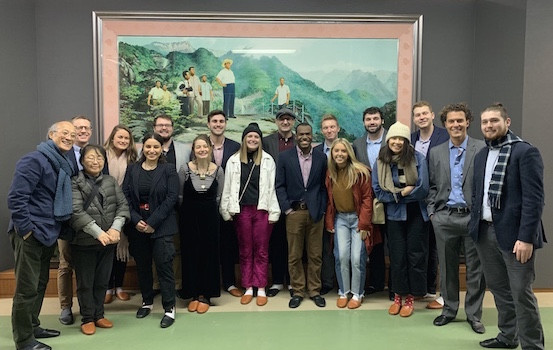
DePauw students on winter term are the first-ever group of U.S. students to visit the schools and institutions of Chongryon, the General Association of Korean Residents in Japan.
About 700,000 ethnic Koreans live in Japan, descendants of Koreans who settled there during Japan’s rule of Korea before World War II; as conscripted laborers during the war; and as post-war refugees.
DePauw students spent the first full day of their visit at Korea University in Tokyo, where students “showed us an intellectually and culturally enriching and entertaining time,” professor Derek Ford writes. “DePauw and Korea University students learned, danced, played music, ate and engaged in authentic dialogue with each other, making what are sure to be lifelong friendships.”
Says Lauren Keltz ’20: “The first day allowed us to get to know and understand the students at the university and the adversities they have faced being Korean in Japan. It also allowed us to gain a new perspective on a topic so commonly misinterpreted or wrongfully claimed in America. The kindness and hospitality given to us at the university was something I will truly cherish and remember.”
Having learned “an immense amount” of Korean history, “we are now better able to understand the continued struggle Koreans suffer in Japan,” says Jalen Friendly ’20. “Through dialogue with both students and faculty, we came to understand why such pride exists in Korean culture. Having to continually fight for their freedom, Koreans explained to us why they felt it was so important to open Korean schools in Japan. Though they were far away from home, their culture was never to be lost.
“Overall, the visit to Korea University is something I will never forget.”
The winter term trip’s mission, says Lauren Schiller ’19. “is to understand their struggle and learn from their resilience. Contrary to the overall negative portrayals of North Koreans in the media, the community that exists in Chongryon in Japan has treated us with an amount of respect that is unparalleled,” she says. “Although we have many days left to continue learning from these misunderstood students, I cannot wait to share their stories of pride, happiness and struggle with everyone who is willing to listen.”
DAY 17 - PODCASTING: CRAFT AND CULTURE
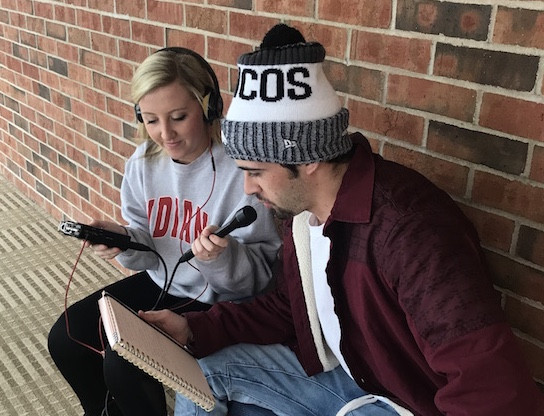
Students are getting tips from professionals and applying them as they create podcasts of their own in the winter term course Podcasting: Craft and Culture.
They’re studying podcasting as a media form that has exploded in the last decade, resulting in more than 500,000 available for download. They’re also learning how to develop, create and distribute a podcast from scratch and, working in two-member teams, producing episodes for the podcast, “J-Term.”
“Each episode features a different on-campus, winter-term course, telling the story of the origins, importance and experience of the course,” says Jonathan Nichols-Pethick, professor of communication and theatre.
Several podcasting professionals have lectured via Skype, including Michael O’Connell, host of the “It’s All Journalism” podcast and author of “Turn Up the Volume: A Down and Dirty Guide to Podcasting,” and Tom Dreisbach, producer of the NPR podcast “Embedded.”
“I took this class because I am very interested in the media in general, and podcasts are really big right now,” says Lexi Manor ’22, pictured here interviewing Emmett McMahon ’21 about his Songwriting Bootcamp winter-term course. “I thought that, by taking this winter term course, it would prepare me to be able to produce my own podcasts in the future.”
DAY 16 - EMERGENCY MEDICAL TECHNICIAN TRAINING
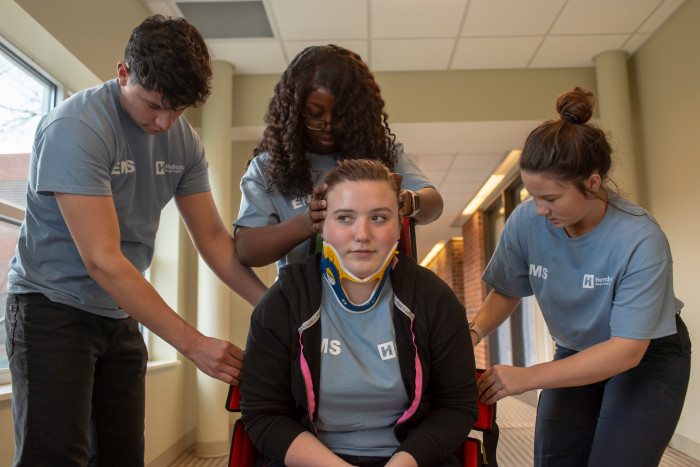
Students preparing for the Indiana EMT-certification exam are getting training in an intensive winter term course.
Those who complete the class, which meets Monday through Saturday for eight hours a day, and pass the state exam will be certified to work as emergency medical technicians in Putnam County and other parts of the country where cross-certification is sanctioned. Students were required to have cardiopulmonary resuscitation certification before enrolling.
The course teaches basic medical skills that EMTs and paramedics use to treat victims of accidents or sudden illness. Students are learning about human anatomy and physiology, as well as advanced treatments with sophisticated and specialized equipment in ambulances.
“This class is really helpful for me because it gives me an idea of what I can actually do in the field,” says Alex Peterson ’19, a biology and global health major who plans to study in a physician assistant program after graduation from DePauw. “And it’s skills that I’ll be able to carry throughout my time in the medical field.”
day 15 - Japanese Culture, Technology and Design
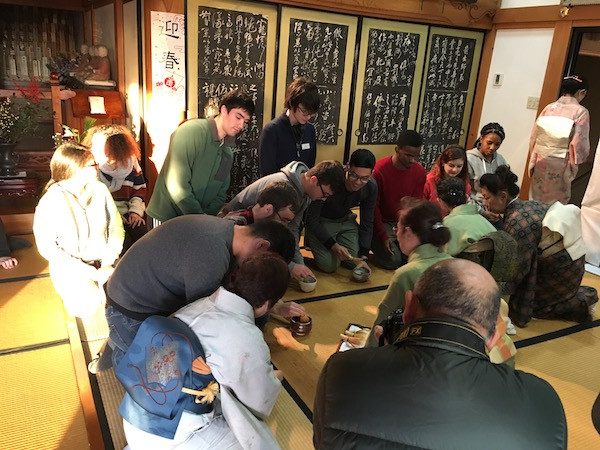
After spending a few days on campus learning fundamentals of Japanese culture and language, students in this course ventured off to Japan to experience firsthand its culture, technology and design, with a focus on how the three interrelate.
Monozukuri, the spirit or determination to produce excellent products and the ability to constantly improve them, is the central theme of the winter term course taught by Asian studies professor Hiroko Chiba and David Berque, associate vice president for student academic life.
In contemporary society, monozukuri is one of the foundations for the production of modern products from cars to robots to video games. And the spirit of monozukuri also can be seen in small items commonly found in Japanese homes.
Students are staying with host families about an hour north of Tokyo in Itakura and are participating in activities, including pottery and judo classes and a tea ceremony, at Toyo University and in the city.
They are focusing on recent technology advancements and innovations, with visits to the National Museum of Emerging Science and Innovation and the department of advanced robotics at the Chiba Institute of Technology.
Students are learning about industrial development in Nagoya, with visits to Toyota Commemorative Museum of Industry and Technology as well as Noritake Museum.
And they’ll learn traditional craftsmanship in Kyoto and visit Nara and Himeji Castle.
“I’ve taken three courses in Japanese language and plan on a minor so coming to Japan was high on my priority list,” sophomore Gavin Ritter says. “I have had a blast so far, and the time spent has already improved my Japanese.”
day 14 - Producing the Short Film: For Actors and Filmmakers
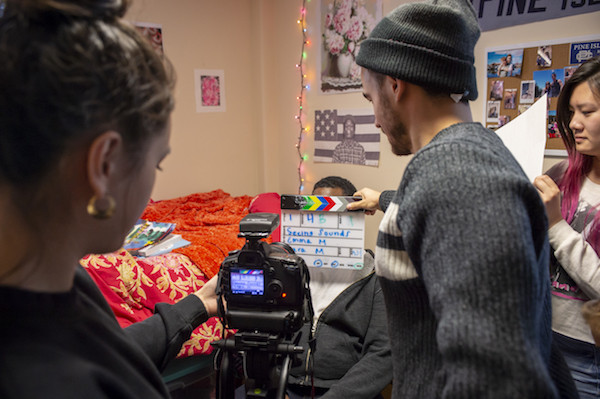
This course for wannabe actors and filmmakers is taught by Alex Thompson, a 2012 DePauw graduate. Thompson is a film producer and director, and is having fun sharing his expertise of short narrative film production with students.
“It's an intense course,” Thompson says, “because not only are most students starting from near zero with their production experience, they're working with limited resources in doing so, and writing several short essays over the course of the term.”
Students are pitching and workshopping executable story ideas, learning proper screenplay format and writing original screenplays of five to seven minutes. Two screenplays will be chosen to produce and cast and crew will be assigned, including director, gaffer, production designer, cinematographer, camera assistant, script supervisor, editing assistant, first assistant director and actors. Both films will be shot.
Students also are learning basic functions of the editing software Adobe Premiere Pro, sound design and score.
The class culminates with a screening of the two films at the Tenzer Technology Center, followed by a discussion session.
“The course is a true marriage of theory and practicum,” Thompson says. “I love both, and think that the theoretical/formalistic training I received at DePauw is what sometimes sets me apart from other filmmakers my age; it allows me to communicate with other departments specifically, as well, since the work is coming from a systemic place. So I like passing that along, and sharing some of my own production experience.”
For Matt Wilson ’22, casting and production have been highlights of the experience. “We’re definitely learning a lot – from enhancing our team-building skills by working with people whom we’ve just met,” he says, “to sculpting an idea and working toward that as a unit.”
Thompson says, “It’s been rewarding to watch students find a new group that might stick together after they graduate or, at the very least, help them make work of their own.
“It can feel overwhelming,” he says, “but I've always thought of DePauw as the perfect sandbox. The resources are there. You just have to muster the drive to utilize them.”
day 13 - DEPAUW CHAMBER SYMPHONY CONCERT TOUR TO JAPAN
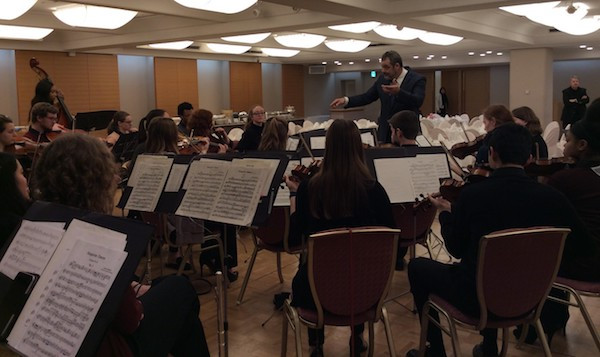
The DePauw Chamber Symphony, the elite core of the DePauw University Orchestra, is spending winter term in Japan for a concert performance tour.
In addition to performing, students are gaining a deeper understanding of the responsibilities that come from performing for new audiences and adding to their knowledge of global citizenship from interacting with this different culture.
“It has been amazing to interact with a culture so much different from my own, and to share music – something so universal – with people from diverse walks of life,” says Keegan Lammers ’22 in an email. “I have enjoyed visiting temples, fish markets and the Tokyo Metropolitan Government building.”
Writes Abby Foehrkolb ’21, a sophomore percussionist: “Being abroad in Japan has been incredible for many expected reasons, but a little unexpectedly, I have found myself impressed with the personal growth of the orchestra. Even though we have only been here for a few days, I already notice others looking out for one another a little more and myself eager to be dependable for the good of the group.
“Admittedly, it can be overwhelming and at times even scary to be halfway around the world, but I feel more at ease knowing that I am here with people who have my back.”
Pictured is a rehearsal with DePauw President D. Mark McCoy, in Japan to recruit students, serving as guest conductor for a piece by Keiko Yamada titled “Suyanama” for the group’s first performance, a recruiting event. Orchestra director Orcenith Smith, a professor of music who teaches tuba, is at right. Nicole Brockmann, associate professor of music who teaches viola and musicianship, also made the trip.
DAY 12 - Preparing for Law School and a Future Law Career
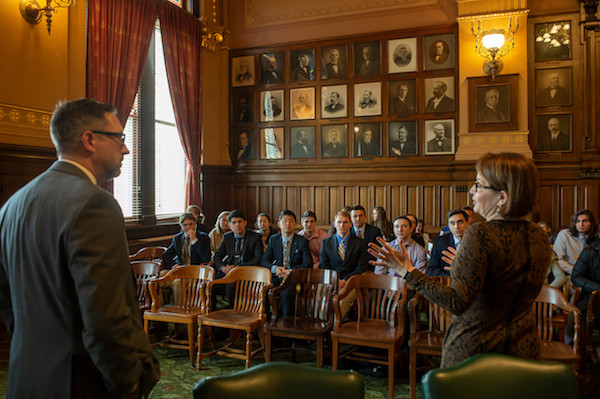
Because of winter term’s short duration, it is the ideal time for students to explore both interests and potential careers. This course provides hands-on opportunities for students to develop skills that will help them apply for and be successful in law school. But it isn’t just for students who are on a law-specific track.
“As a senior, I’m getting ready to graduate and move to New Jersey to start my commitment with Teach for America,” says Libby Kaiser ’19. “I hope to attend law school afterward and I was drawn to this class because I felt it would help me decide which avenue of law to pursue and become more familiar with the application process. I hope to come out of the class with more clarity and preparation for my future.”
Nicole Burts ’13, DePauw’s pre-law adviser and Coquillette Peer Consultants coordinator, teaches the course; she holds a law degree. In addition, Gerald “Jerry” Haberkorn ’83, who practices corporate law in Chicago, teaches a multi-day section about corporate law.
To showcase all areas of law and the judicial system, the class travels to the Indiana Supreme Court, meets with justices and judges and attends a naturalization ceremony. Students also mull how to think like a law student and learn about prospective careers they may pursue with a law degree.
day 11 - The classical tradition in italy
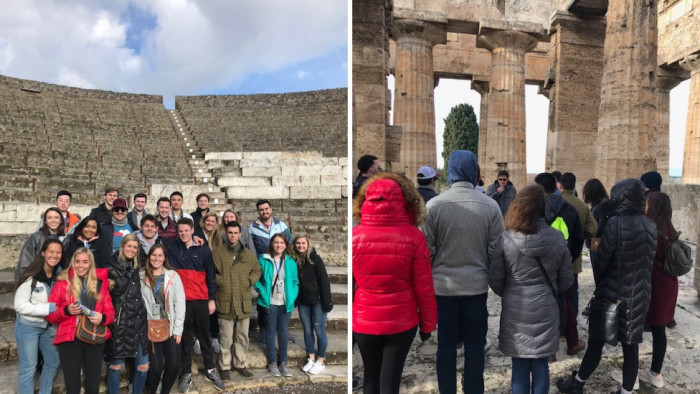
DePauw students are viewing some of the most revered art and visiting some of most famous structures in the world this winter term as part of the Classical Tradition in Italy course.
And they’re dining on some scrumptious food too.
The course focuses on the art, history and politics of Italy and how they are shaped and defined by the country's relationship with ancient Rome. Students are traveling through Italy alongside Dave Guinee, professor of classical studies.
“I’ve always been intrigued with Italian culture and its rich history,” says Ty Hou ’19. “This trip has broadened my perspective with new outlooks and ways of thinking. Trying new foods, witnessing traditional customs and learning the history of the country have reinforced the importance of being global-minded.”
Students are spending a week in Rome, studying and exploring the Roman Forum, the Colosseum, the Vatican museums, St. Peter's Basilica and early Christian churches. Then they’re heading to southern Italy and the Bay of Naples before traveling to Tuscany to study Florence, Siena and surrounding towns.
Students are spending most days on guided site visits and are responsible for readings, keeping journal entries and preparing presentations during their stay.
day 10 - Adapted Enchantment: Children’s Lit in London and Paris
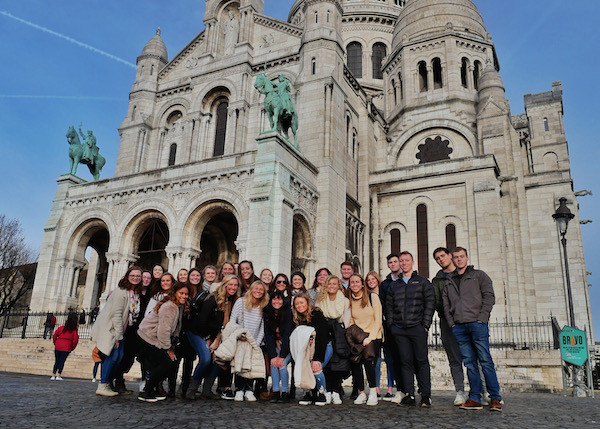
They aren’t visiting Hogwarts – it’s unlikely any DePauw students can breach the brick wall that hides platform 9 ¾ at King’s Cross rail station – but those taking the winter term course called “Adapted Enchantment: Children’s Lit in London and Paris” are exploring plenty of other famous sites cited in children’s books.
The class, led by Kayla Birt Flegal, access and outreach services librarian at Roy O. West Library, and Tamara Stasik, assistant English professor, already have explored Paris sites from the Madeline series, such as Sacré-Cœur Basilica, Notre-Dame Cathedral, Pont Neuf and the Eiffel Tower. Also on the agenda are British sites such as Christ Church College at the University of Oxford, where the Harry Potter movies were filmed and Lewis Carroll wrote “Alice in Wonderland,” and Ashdown Forest, the inspiration for Pooh’s Hundred Acre Wood.
Visiting those sites have made for “a magical trip,” says Ali Grimm ’19, who was eager to learn “how people like J.K. Rowling were inspired to write their novels and how children fit into both imaginative and real life spaces.”
Grimm says she chose this winter term trip because she has wanted to visit London and Paris since she was a little girl. What’s more, “I also grew up reading and watching several of the children’s literature books and movies and wanted to see them come to life at the exact places they were born.”
Throughout the trip, the students are working on a project with the Tenzer Technology Center using 360-degree cameras. They’re shooting and annotating images with text to answer questions about privilege and diversity, such as “Who is invited here?,” “Who is not invited here?,” “Are children welcome?” and “Would the story be able to happen in this space in its current state?”
day 9 - Tropical Ecology in Costa Rica: Writing Nature
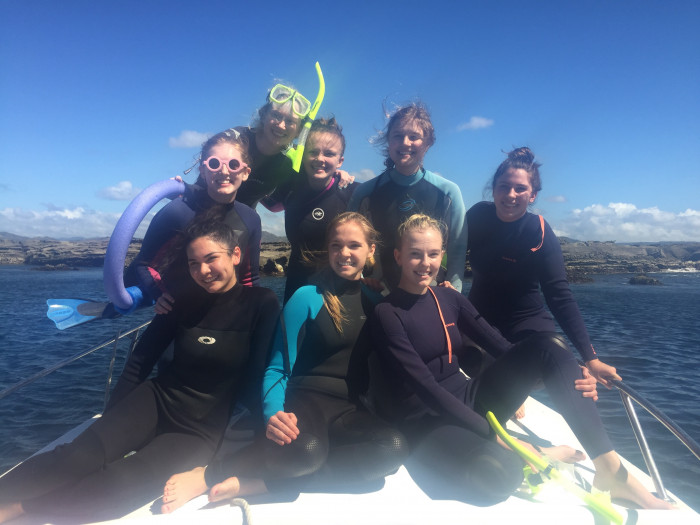
Students who signed up for English professor Joe Heithaus and biology professor Janet Vaglia’s course were asked to be ready to work, hike, listen and write about their experiences during their two-week adventure to one of the most biodiverse and ecologically minded countries in the world.
By exploring Santa Elena Gulf, the Guanacaste Conservation Area and Monteverde Cloud Forest Biological Reserve, students are being introduced to the complex issues of tropical ecology of Costa Rica.
The group is meeting biologists and parataxonomists in Guanacaste Conservation Area, where they work to inventory the area’s immense diversity of flora and fauna using DNA barcoding. In Monteverde, students are participating in sustainable agriculture on a coffee farm and taking guided hikes in the cloud forest.
Heithaus says that students are keeping journals, writing essays and preparing a final project “to better understand and communicate what is at stake in preserving and protecting these critical ecosystems in the face of human threats.”
Becca Sellers ’19 says their first day was spent in the Santa Elena Gulf. “The fishermen who transported us on their boats showed us examples of their conservation efforts,” she says. “They use nets as fish farms for snappers, which were once in danger of being overfished, but now the fishermen are confident the species and their own livelihoods have been saved.”
day 8 - Athletics Administration and Sports Management
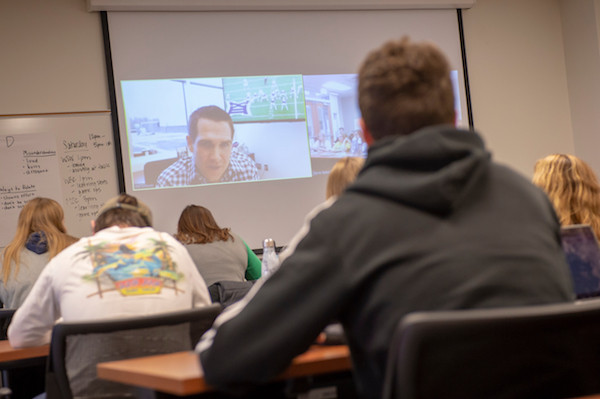
One need not be a super athlete to have a career in collegiate or professional sports. Students who want to be close to but not on the playing field can take this course, in its fourth year as a winter term offering, to get a broad overview of the sports industry, including a scan of career opportunities and skill sets needed to succeed in athletics administration.
Who better to teach the course than Stevie Baker-Watson, DePauw’s associate vice president for campus wellness and the Theodore Katula director of athletics and recreational sports, who has 20 years of experience in the field?
Baker-Watson’s knowledge and connections provides opportunities for students in the class to visit with sports organizations such as the Indiana Pacers and hear from alumni in the field, such as Joe Schoen ’01, the assistant general manager for the Buffalo Bills.
Students in the class are seeking to develop a basic understanding of consumer behavior, segmentation, strategic management, budgeting, facility management, risk management and ethics in the sport setting.
day 7- Radio Management and Programming
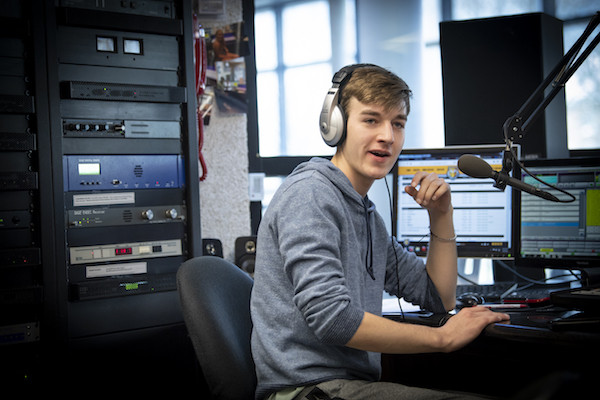
After just a week of working at DePauw’s WGRE-FM, Ethan Krohne ’22 says he already has evolved from being just a passive radio listener to understanding the workings of a broadcast operation.
“This class has opened up my eyes to other sides of radio that I never thought about before,” Krohne says. “Before this class I looked at radio as simply a form of broadcasting but I never put much thought into the business and that’s something this class has really begun to teach me.”
He and his classmates participate in the daily operation of WGRE-FM – the nation’s first 10-watt college station. They are learning how a station is organized and how to operate facilities for sports and news programs. Students also are taking on roles of production and promotion for the station, which otherwise would sit empty while the university is not in full session.
In addition to class time, students each take an on-air shift during the term, so be sure to tune in on wgre.org to check in on their work.
day 6 - south africa: life after mandela
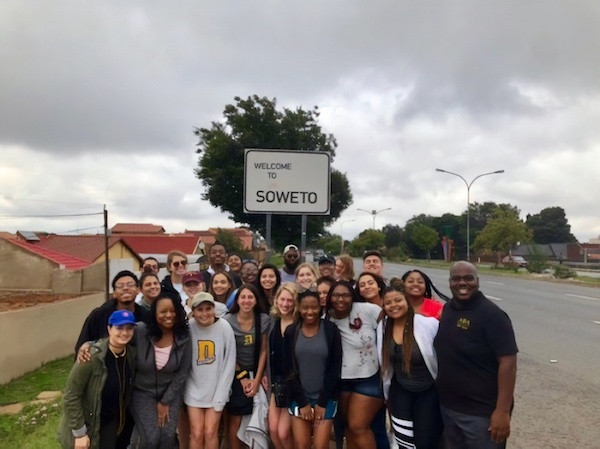
Nelson Mandela’s life journey took him from anti-apartheid activism through 27 years as a political prisoner and ultimately to the presidency of South Africa. When the international figure died in 2013, news reports depicted the country as having achieved racial harmony. But has it?
With the guidance of political science professor Clarissa Peterson and Emmitt Riley, assistant professor of Africana studies, students are considering that question in their winter term course, South Africa: Life after Mandela. They’re visiting Johannesburg, Durban and Cape Town and the country’s most important landmarks.
day 5 - star wars
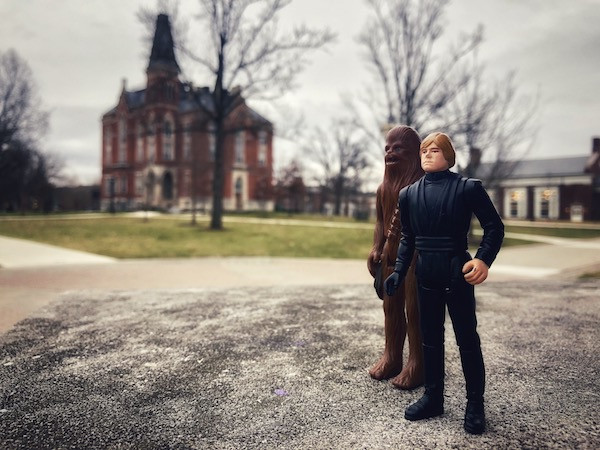
It’s no wonder professor Matt Dillon’s winter term course was wait-listed. Its topic has intrigued science fiction and fantasy enthusiasts for generations: Star Wars.
Students are studying the pop-culture phenomenon Star Wars through a religious studies lens – Dillon’s discipline – by treating the films as a modern myth.
Using theories and methods from religious studies to analyze the Evil Empire, the Force and the Rebellion, students explore allegorical themes in the galaxy.
Questions used in this study include: How are we to understand the abiding influence and popularity of these films? What meaning do viewers find in them?
Not only will students come away from the course with a deep understanding of the Star Wars films, but the course also aims to provide a working knowledge of theoretical tools used in humanities disciplines.
day 4 - Art, Community and the Border
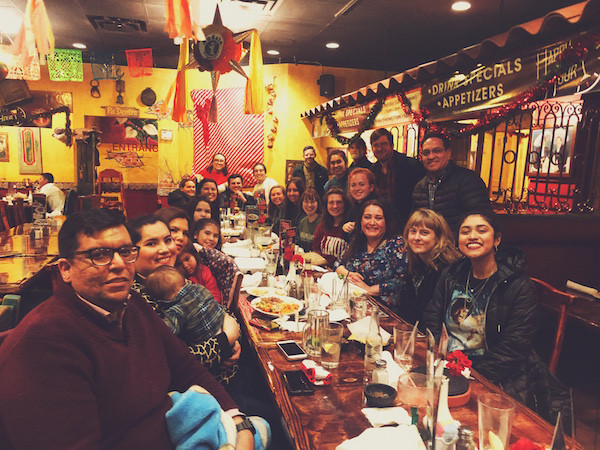
DePauw art students are in Texas, where those considering a career in the visual arts are getting practical, tangible and professional experience.
Students taking the Art, Community and the Border winter term class will create an art exhibition, explore the plains of west Texas, camp under the stars, discuss their art with professional visiting artists, visit museums and experience an art residency,” says John Berry, assistant professor of art and art history. “Our art-making, readings, critiques and discussions will examine Minimalism, border politics and the individual and communal purposes of the visual arts.”
Over the three-week excursion, students will visit the world-renowned Chinati and Judd foundations in Marfa, Texas, and stay at 100W, a residency program in Corsicana that was cofounded by Travis LaMothe ’10, who studied studio art at DePauw.
“We will be making art together, culminating in a group exhibition in a neighboring space,” Berry says. “This means the class provides two distinctive professional benefits to students: experience with an art residency program and a group exhibition – both important elements for an artist's resume.”
day 3 - winter term in service: El salvador
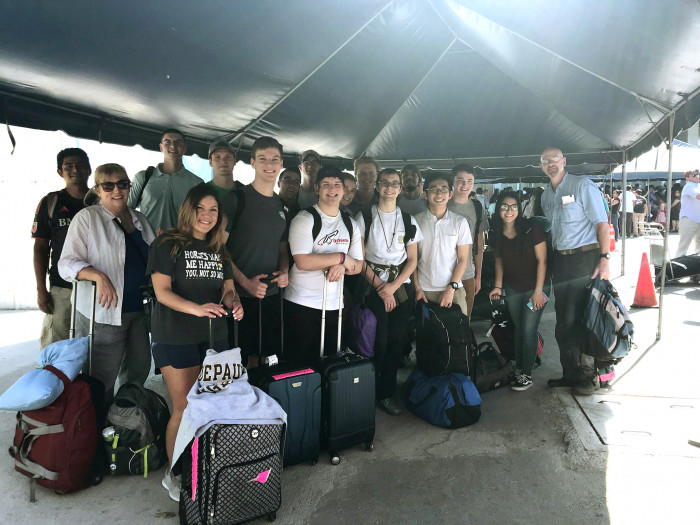
Doug Harms tells his students upfront: Don’t apply for his winter-term-in-service course in El Salvador if you’re a picky eater or a nonstop cell phone user who is easily offended.
And don’t apply if you merely want to work on a project.
Apply, he tells them, if you want to wrestle with and reflect on important issues, learn about service (the good, the bad and the ugly, he says) and advance your understanding of the relationship between the United States and Latin American countries.
With those caveats in mind, 14 DePauw students are spending the three weeks of winter term in El Salvador, living with local families, eating food prepared by locals and toiling most of every day to expand a primitive community center in Ichanqueso, a community of about 500 people northeast of San Salvador, the country’s capital. They are accompanied by Harms, a computer science professor, and co-leader Tavia Pigg, assistant director of the Science Research Fellows Program.
The students, whose first taste of El Salvador – literally – was a pupusa, a traditional Salvadoran dish, spent the first two days of the trip learning about Salvadoran history and culture and visiting sites related to St. Óscar Romero, the Roman Catholic archbishop assassinated in 1980 and canonized in October.
Students who take the course must sign a “confirmation of understanding” about their visit, which says in part that they understand they are learners, not tourists, saviors, experts or critics. “Cultural humility,” the document says, “is prerequisite for a successful cross-cultural experience.”
day 2 - The Flourishing Life: How to live a meaningful, accomplished, joyful life
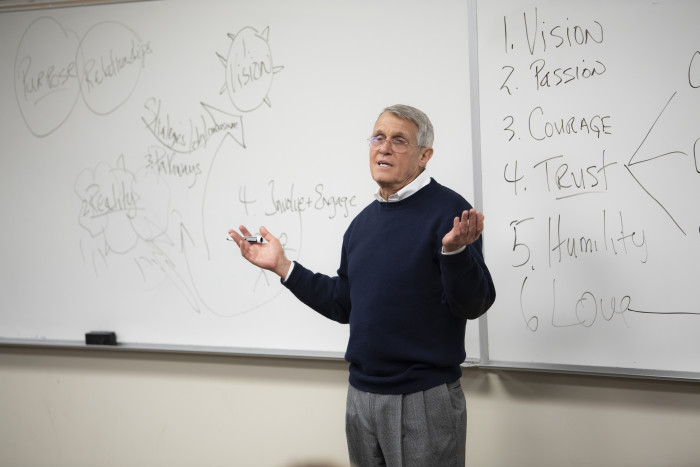
What gives life meaning and purpose? How does one move beyond surviving to flourishing?
Doug Smith ’68 developed his winter term course, The Flourishing Life, to encourage students to seek answers to those questions and thereby fulfill DePauw's mission to develop leaders the world needs.
The course challenges students to answer the question: What does it mean to be a successful human being? Required texts include “What Happy People Know” by Dan Baker, who has devoted his life to teaching people how to be happy, and “Man’s Search for Meaning” by Viktor Frankl.
Students will learn skills such as gratitude and flexibility, how to avoid traps and have greater resilience or grit in the face of setbacks in order to live with joy in the present and flourish.
Day 1 - Campanology
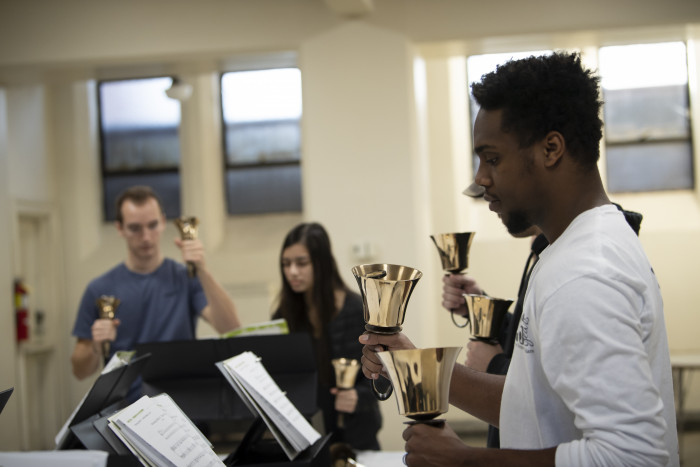
Students don’t need musical experience to take computer science professor Brian Howard’s campanology course. Whether they’re accomplished musicians or neophytes, students who take the three-week course in bell ringing will be ready to perform Jan. 24 at an English handbell concert in Gobin Memorial United Methodist Church.
Campanology is the art or practice of bell ringing. And during the winter term course, students will not only learn how to play English handbells, they also will learn about the history and practice of bell ringing.
Bells have been used for music and communication since ancient times, and part of the course will be devoted to reading and discussing bell-related literature, including Edgar Allen Poe’s “The Bells” and Dorothy L. Sayers’ “The Nine Tailors.”
Students will examine the physics of bells and their unique harmonics, as well as mathematical patterns in the ringing of bells.
Field trips to bell towers near Greencastle to experience carillon music and change-ringing are scheduled. Presentations on an aspect of the history of bells are required, and students will be evaluated on their contribution to class discussions, rehearsals and the final performance.
Howard says the culminating concert is noteworthy. “The concert we give on the last day, where 11 students who have generally never rung handbells before – and in some cases never read music before –will be about a half an hour of music performance.”
Browse other stories
-
Athletics
-
Football - 336 Students Named to 2025 Spring Tiger Pride Honor Roll
-
Football - DePauw-Record 190 Student-Athletes Named to NCAC's Dr. Gordon Collins Scholar-Athlete Honor Roll
-
Football - DePauw Unveils 2025 Athletics Hall of Fame Class
More Athletics
-
-
News
-
Outstanding scholars named to Spring 2025 Dean's List
-
Alumni News Roundup - June 6, 2025
-
Transition and Transformation: Inside the First-Year Experience
More News
-
-
People & Profiles
-
11 alums make list of influential Hoosiers
-
DePauw welcomes Dr. Manal Shalaby as Fulbright Scholar-in-Residence
-
DePauw Names New Vice President for Communications and Strategy and Chief of Staff
More People & Profiles
-
-
Have a story idea?
Whether we are writing about the intellectual challenge of our classrooms, a campus life that builds leadership, incredible faculty achievements or the seemingly endless stories of alumni success, we think DePauw has some fun stories to tell.
-
Communications & Marketing
101 E. Seminary St.
Greencastle, IN, 46135-0037
communicate@depauw.eduNews and Media
-
News media: For help with a story, contact:
Bob Weaver, Senior Director of Communications.
bobweaver@depauw.edu.